Pilar, Bataan
Pilar, officially the Municipality of Pilar (Tagalog: Bayan ng Pilar), is a 3rd class municipality in the province of Bataan, Philippines. According to the 2020 census, it has a population of 46,239 people.[3]
Pilar | |
|---|---|
| Municipality of Pilar | |
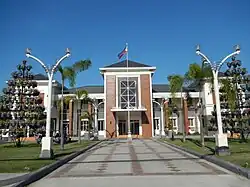 Pilar Municipal Hall | |
 Flag  Seal | |
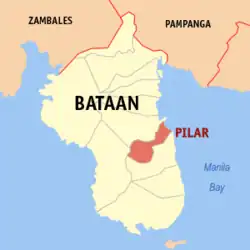 Map of Bataan with Pilar highlighted | |
OpenStreetMap | |
.svg.png.webp) Pilar Location within the Philippines | |
| Coordinates: 14°40′N 120°34′E | |
| Country | Philippines |
| Region | Central Luzon |
| Province | Bataan |
| District | 2nd district |
| Founded | April 6, 1917 |
| Barangays | 19 (see Barangays) |
| Government | |
| • Type | Sangguniang Bayan |
| • Mayor | Carlos F. Pizarro, Jr. |
| • Vice Mayor | Marino H. Caguimbal |
| • Representative | Jose Enrique S. Garcia III |
| • Municipal Council | Members |
| • Electorate | 30,946 voters (2022) |
| Area | |
| • Total | 37.60 km2 (14.52 sq mi) |
| Elevation | 13 m (43 ft) |
| Highest elevation | 143 m (469 ft) |
| Lowest elevation | 0 m (0 ft) |
| Population (2020 census)[3] | |
| • Total | 46,239 |
| • Density | 1,200/km2 (3,200/sq mi) |
| • Households | 10,651 |
| Economy | |
| • Income class | 3rd municipal income class |
| • Poverty incidence | 7.29 |
| • Revenue | ₱ 196.3 million (2020) |
| • Assets | ₱ 473.7 million (2020) |
| • Expenditure | ₱ 134.2 million (2020) |
| • Liabilities | ₱ 58.18 million (2020) |
| Service provider | |
| • Electricity | Peninsula Electric Cooperative (PENELCO) |
| Time zone | UTC+8 (PST) |
| ZIP code | 2102 |
| PSGC | |
| IDD : area code | +63 (0)47 |
| Native languages | Mariveleño Tagalog |
| Website | www |
The Bataan Government Center and the historic Mount Samat National Shrine (Dambana ng Kagitingan) are both situated within the municipality in Barangays Diwa and Ala-uli, respectively.
Etymology
The town was named in the honor of the image of the Our Lady of the Pillar, hence the town was called "Pilar".
History
One of the oldest towns of Bataan, Pilar was previously part of Pampanga. Spaniards in the galleon landed in a sitio of Balanga and were greeted by the natives.
Geography
Pilar is located in eastern part of Bataan Peninsula, bordering Balanga (the provincial capital) to the north, Orion to the south, Bagac to the west, and Manila Bay to the east. It is 1 kilometre (0.62 mi) from Balanga and 125 kilometres (78 mi) from Manila.
According to the Philippine Statistics Authority, the municipality has a land area of 37.60 square kilometres (14.52 sq mi) [5] constituting 2.74% of the 1,372.98-square-kilometre- (530.11 sq mi) total area of Bataan.
Climate
| Climate data for Pilar, Bataan | |||||||||||||
|---|---|---|---|---|---|---|---|---|---|---|---|---|---|
| Month | Jan | Feb | Mar | Apr | May | Jun | Jul | Aug | Sep | Oct | Nov | Dec | Year |
| Average high °C (°F) | 31 (88) |
32 (90) |
34 (93) |
35 (95) |
33 (91) |
31 (88) |
29 (84) |
29 (84) |
29 (84) |
29 (84) |
30 (86) |
31 (88) |
31 (88) |
| Average low °C (°F) | 19 (66) |
19 (66) |
20 (68) |
23 (73) |
25 (77) |
25 (77) |
24 (75) |
25 (77) |
25 (77) |
24 (75) |
23 (73) |
20 (68) |
23 (73) |
| Average precipitation mm (inches) | 7 (0.3) |
8 (0.3) |
14 (0.6) |
26 (1.0) |
127 (5.0) |
210 (8.3) |
263 (10.4) |
272 (10.7) |
218 (8.6) |
114 (4.5) |
46 (1.8) |
21 (0.8) |
1,326 (52.3) |
| Average rainy days | 4.0 | 4.0 | 6.9 | 11.2 | 21.0 | 24.5 | 27.4 | 26.9 | 25.9 | 21.9 | 13.4 | 6.3 | 193.4 |
| Source: Meteoblue (modeled/calculated data, not measured locally)[6] | |||||||||||||
Barangays
Pilar is politically subdivided into 19 barangays.[7] Each barangay consists of puroks and some have sitios.
| PSGC | Barangay | Population | ±% p.a. | |||
|---|---|---|---|---|---|---|
| 2020[3] | 2010[8] | |||||
| 030811001 | Ala‑uli | 9.6% | 4,458 | 3,895 | 1.36% | |
| 030811003 | Bagumbayan | 3.1% | 1,427 | 1,370 | 0.41% | |
| 030811005 | Balut I | 2.5% | 1,151 | 1,259 | −0.89% | |
| 030811006 | Balut II | 2.7% | 1,260 | 1,311 | −0.40% | |
| 030811007 | Bantan Munti | 1.0% | 467 | 550 | −1.62% | |
| 030811009 | Burgos | 2.7% | 1,227 | 1,166 | 0.51% | |
| 030811011 | Del Rosario (Poblacion) | 4.0% | 1,847 | 1,886 | −0.21% | |
| 030811012 | Diwa | 5.4% | 2,491 | 2,253 | 1.01% | |
| 030811013 | Landing | 2.8% | 1,311 | 1,246 | 0.51% | |
| 030811014 | Liyang | 5.1% | 2,345 | 1,839 | 2.46% | |
| 030811016 | Nagwaling | 6.5% | 3,006 | 2,568 | 1.59% | |
| 030811019 | Panilao | 11.9% | 5,488 | 5,250 | 0.44% | |
| 030811020 | Pantingan | 3.1% | 1,442 | 1,282 | 1.18% | |
| 030811021 | Poblacion | 3.0% | 1,399 | 1,346 | 0.39% | |
| 030811022 | Rizal (Poblacion) | 1.8% | 847 | 1,082 | −2.42% | |
| 030811023 | Santa Rosa | 15.0% | 6,942 | 6,549 | 0.58% | |
| 030811025 | Wakas North | 2.4% | 1,109 | 1,501 | −2.98% | |
| 030811026 | Wakas South | 3.5% | 1,616 | 1,497 | 0.77% | |
| 030811027 | Wawa | 4.3% | 1,990 | 1,937 | 0.27% | |
| Total | 46,239 | 39,787 | 1.51% | |||
Demographics
|
| |||||||||||||||||||||||||||||||||||||||||||||||||||
| Source: Philippine Statistics Authority[9][8][10][11] | ||||||||||||||||||||||||||||||||||||||||||||||||||||
In the 2020 census, Pilar had a population of 46,239.[3] The population density was 1,200 inhabitants per square kilometre (3,100/sq mi).
Economy
Government
Local government
Pursuant to the Local Government Code of the Philippines",[19][20] the political seat of the municipal government is located at the Municipal Hall. In the Spanish period, the Gobernadorcillo was the Chief Executive who held office in the Presidencia. During the American rule (1898–1946), the elected Mayor and local officials, including the appointed ones held office at the Municipal Hall. The legislative and executive departments perform their functions in the Sangguniang Bayan (Session Hall) and Municipal Trial Court, respectively, and are located in the Town Hall.
Elected officials
| Position | Name of official |
|---|---|
| District Representative (2nd Legislative District, Bataan) | Jose Enrique S. Garcia III |
| Municipal Mayor | Alice D. Pizarro |
| Municipal Vice Mayor | Marino Caguimbal |
| Municipal Councilors | Fatima Elisa E. Nalus |
| Cecilia R. Garcia | |
| Rodelio A. Paguio | |
| Gerry S. Sanchez | |
| Edgardo Z. Lulu | |
| Cipriano P. Paguio | |
| Reno C. Gatdula | |
| Aurea L. Iguico | |
Pilar, Bataan's elected officials are Mayor Alice D. Pizarro (National Unity) and Vice Mayor Marino Caguimbal (National Unity).
The eight Sangguniang Bayan Members led by the Vice Mayor hold office at the Pilar Sangguniang Bayan Session Hall.
Tourism
Landmarks and festivals of Pilar include:
- Mount Samat Zipline — longest zipline in Luzon[21]
- Veterans Park — located in Poblacion, Piazza Della Virgen del Pilar
- Mount Samat National Shrine — 92-metre-high (302 ft) War Memorial Cross some 555 metres (1,821 ft) above sea level.[22]
- The Flaming Sword — located at Panilao, is a landmark depicting a hand holding a flaming sword up in the air, which symbolized the Filipino patriots' courage and gallantry as they face the adversary and threats to their democracy and freedom. The ESPADA was inaugurated on April 8, 1967.
- Dunsulan Falls
- Araw ng Kagitingan — celebrated every April 9
Our Lady of the Pillar Parish Church
The 1801 Our Lady of the Pillar Parish Church (Nuestra Señora del Pilar Parish Church,[23] belongs to the Roman Catholic Diocese of Balanga[24][25][26] (Dioecesis Balangensis) Part of the Ecclesiastical Province of San Fernando, Pampanga.[27]
Notable personalities
- Mel Tiangco — Barangay Santa Rosa - news Anchor of GMA7
- Manuel C. Herrera — lawyer, an instructor in the University of the Philippines
Gallery
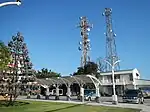 Health center
Health center The Flaming Sword Shrine
The Flaming Sword Shrine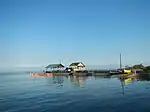 Port and bancas
Port and bancas Our Lady of the Pillar Parish Church
Our Lady of the Pillar Parish Church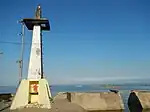 Light house
Light house
References
- Municipality of Pilar | (DILG)
- "2015 Census of Population, Report No. 3 – Population, Land Area, and Population Density" (PDF). Philippine Statistics Authority. Quezon City, Philippines. August 2016. ISSN 0117-1453. Archived (PDF) from the original on May 25, 2021. Retrieved July 16, 2021.
- Census of Population (2020). "Region III (Central Luzon)". Total Population by Province, City, Municipality and Barangay. Philippine Statistics Authority. Retrieved 8 July 2021.
- "PSA Releases the 2018 Municipal and City Level Poverty Estimates". Philippine Statistics Authority. 15 December 2021. Retrieved 22 January 2022.
- "Province: Bataan". PSGC Interactive. Quezon City, Philippines: Philippine Statistics Authority. Retrieved 12 November 2016.
- "Pilar: Average Temperatures and Rainfall". Meteoblue. Retrieved 26 April 2020.
- "Municipal: Pilar, Bataan". PSGC Interactive. Quezon City, Philippines: Philippine Statistics Authority. Retrieved 8 January 2016.
- Census of Population and Housing (2010). "Region III (Central Luzon)" (PDF). Total Population by Province, City, Municipality and Barangay. National Statistics Office. Retrieved 29 June 2016.
- Census of Population (2015). "Region III (Central Luzon)". Total Population by Province, City, Municipality and Barangay. Philippine Statistics Authority. Retrieved 20 June 2016.
- Censuses of Population (1903–2007). "Region III (Central Luzon)". Table 1. Population Enumerated in Various Censuses by Province/Highly Urbanized City: 1903 to 2007. National Statistics Office.
- "Province of Bataan". Municipality Population Data. Local Water Utilities Administration Research Division. Retrieved 17 December 2016.
- "Poverty incidence (PI):". Philippine Statistics Authority. Retrieved December 28, 2020.
- "Estimation of Local Poverty in the Philippines" (PDF). Philippine Statistics Authority. 29 November 2005.
- "2003 City and Municipal Level Poverty Estimates" (PDF). Philippine Statistics Authority. 23 March 2009.
- "City and Municipal Level Poverty Estimates; 2006 and 2009" (PDF). Philippine Statistics Authority. 3 August 2012.
- "2012 Municipal and City Level Poverty Estimates" (PDF). Philippine Statistics Authority. 31 May 2016.
- "Municipal and City Level Small Area Poverty Estimates; 2009, 2012 and 2015". Philippine Statistics Authority. 10 July 2019.
- "PSA Releases the 2018 Municipal and City Level Poverty Estimates". Philippine Statistics Authority. 15 December 2021. Retrieved 22 January 2022.
- "the 1987 Constitution of the Republic of the Philippines". Official Gazette of the Republic of the Philippines. Archived from the original on 22 January 2009. Retrieved 19 January 2021.
- "The Local Government Code Of The Philippines - Chan Robles Virtual Law Library". Chanrobles.com. Retrieved 2016-11-21.
- "Longest zipline sa Luzon, pinasinayaan sa Pilar, Bataan | Video". GMA News. 2012-01-09. Retrieved 2016-11-22.
- "WW2 historical markers remind Pinoys of Bataan's role on Day of Valor | Lifestyle". GMA News. Retrieved 2016-11-22.
- "Welcome to Pilar Parish". Archived from the original on 2011-08-11. Retrieved 2013-01-30.
- "ParishesV1". Balangadiocese.com. Retrieved 2016-11-22.
- "Diocese of Balanga". Archived from the original on 2012-09-06. Retrieved 2013-01-27.
- "Diocese of Balanga". Archived from the original on 2014-05-17. Retrieved 2013-01-27.
- "Olp-pilar.org - HOME". Archived from the original on 2012-11-13. Retrieved 2013-01-30.